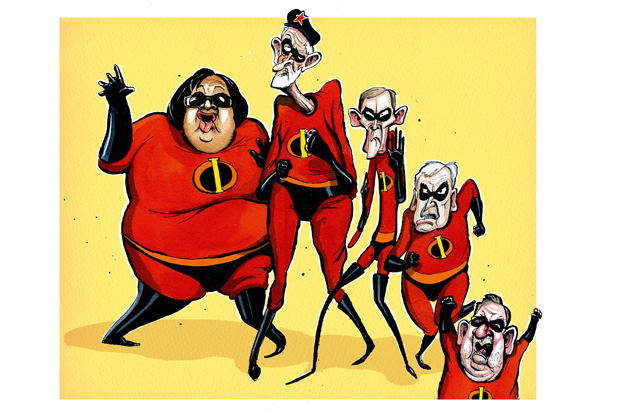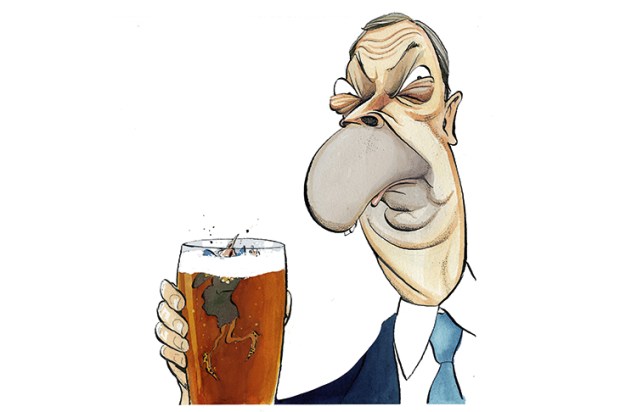This leadership contest was meant to topple Jeremy Corbyn, or at the very least weaken him. It looks almost certain to end up strengthening him. After the result is declared on Saturday, the Corbynites will be emboldened to go after all those who stand in their way, from the general secretary and the deputy leader to party staff and regional organisers. They are tightening their grip over the party from top to bottom, something the Blairites never did.
Alarmingly for the moderates, the party could be beyond saving by 2020. Even the Parliamentary Labour Party, a bastion against Corbynism, could be pushed hard to the left at the next election. Candidate selection will enable Momentum and co. to oust some of their most determined foes. But if boundary changes go through ahead of the next election, the purge could go far further than that.
Labour MPs are resigned to Corbyn winning again. Word has it that the online votes, the vast majority of which are already in, are heavily in his favour. Even Owen Smith, his opponent, has admitted that the Labour leader has been challenged too early in his tenure.
Corbyn’s achievement is remarkable. His personal ratings are dire and Labour trail the Tories by a double-digit margin in the polls. And yet, somehow, he still commands the loyalty of the Labour ‘selectorate’.
The worry for his Labour opponents is that Corbyn hasn’t remotely exhausted his well of potential support. In this election, he was handicapped by a series of rules designed to keep out many of his supporters. Members can vote only if they joined the party by 12 January, barring the tens of thousands who rushed to sign up when it became clear that Corbyn’s position was under threat.
Party HQ, which has yet to fall to the Corbynites, then set about disqualifying those who had indicated their support for other parties on social media or been abusive. (A popular joke among Labour MPs is that the Green party has only ever won one major election — the Labour leadership contest of 2015). More than 40,000 registered supporters have been blocked, and still Corbyn looks set to command a huge majority.
‘Saving Labour’, the anti-Corbyn group, says it has signed up 120,000 people to vote in this election. To be sure of victory, the anti-Corbynites need far more than that.
Part of the problem is that their sell is a hard one. ‘Join our party because our leader is unelectable’ is not the most persuasive pitch. Another is that diehards of the old Labour right are fundamentally uncomfortable with mass participation. They’d rather shrink the selectorate to a more manage-able number than radically expand it, which makes them look anti-democratic.
But the biggest problem is the talent deficit in the Labour party; the lack of a truly outstanding politician for the internal opposition to rally around. If Owen Smith — whose campaign never really recovered after Diane Abbott denounced him as a drugs company ‘lobbyist’ in the opening days of the race — is Labour’s best alternative, then the party really does have a problem.
Smith’s campaign highlighted the bind that Labour moderates are in. For the purposes of this contest, he felt obliged to try to appeal to the left via a series of statements — about the need for talks with Islamic State, the possibility of Britain joining both the euro and the border-free Schengen zone, and his support for higher taxes — that would make him unelectable nationally.
Some Labour moderates are determined to have another go at taking down Corbyn. There is talk of a dedicated campaign to sign up hundreds of thousands of new members, then mount a new challenge before the next general election. But it isn’t clear why this membership drive would be any more likely to succeed. A more radical solution would be to change the law so that when people register to vote in a general election, they can declare their party affiliation. That would mean Labour voters could then be balloted far more effectively during the party’s leadership elections. Such a change would make party selectorates far more representative of parties’ nationwide support. Under these rules, a hard-left candidate could not win the Labour leadership. However, such a change seems highly unlikely. Parliament would have to vote for it, but there is no caucus of MPs advocating it — and changing Labour’s own rules would require the National Executive Committee’s support.
The last great hope of the moderates is that an electoral drubbing in 2020 will bring the party to its senses. But there is no guarantee of that. The hard left will simply blame the constant sniping against Corbyn for the defeat. Winning is also not that important to many of Corbyn’s supporters; Tony Blair’s great crime in their eyes was to compromise with the electorate in pursuit of power.
So if defeat in 2020 won’t sober the party up, what will? Well, perhaps nothing. It used to be said that the trade unions and Scottish Labour kept the party from veering too far left. But the most powerful union, Unite, shows no sign of wanting to help the forces of moderation. Len McCluskey, its general secretary, is siding with Corbyn in procedural fights rather than with his old flatmate, the deputy Labour leader Tom Watson. And once-mighty Scottish Labour now consists of one MP and fewer MSPs than the Scottish Tories.
Everyone at Westminster can recite the arguments against setting up a new party. The electoral system makes it very hard for any new force to break through. At the 2015 general election Ukip won 13 per cent of the vote but only one MP. Moreover, there is the Labour name — which is probably worth the support of somewhere between 15 and 20 per cent of the electorate. It is hard to see how a social democratic party could succeed without this tribal backing.
But it is becoming even more difficult to see how the social-democratic wing of Labour can take the party back. Vote Leave’s success in building a winning nationwide ground game in only ten weeks shows that technology is reducing the barriers to entry in politics. The Labour brand is already much diminished — and things could get worse: there is even talk of the Communist Andrew Murray becoming the next general secretary. To add to the mix of bad news for Labour, there is also the fact that the Tories are busy moving onto the turf that Labour is abandoning. If it takes Labour a decade to decide to return to the centre, they will find that the Tories have dug themselves firmly into that middle ground.
To date, most speculation about a new party has centred on the idea of some kind of pro-EU grouping. But Continuity Remain is a poor basis for a party that actually seeks power. We already have the Liberal Democrats. This new party would — from its inception — be fighting a battle of the past. Labour MPs in northern and Welsh working-class seats would be committing electoral suicide if they failed to accept the referendum’s clear message that their voters don’t want unlimited EU immigration any more.
Much of New Labour’s success was chalked up to offering voters a chance to combine economic efficiency with social justice, or at least appearing to. But as one Tory veteran of 1997 remembers, what actually made the Blair-led party so electorally potent was its cultural understanding of middle England. This was best summed up by the phrase ‘tough on crime, tough on the causes of crime’. Any new party would have to rediscover that knack of tapping into the mainstream of British opinion.
A Corbyn victory will be met by a defiant chorus of ‘We’re not going anywhere’ from moderate Labour MPs. But the painful truth is that Labour is not their party any more. Corbyn and his comrades on the far left are in charge. Those who think Britain needs a sensible centre-left party need to set one up. Labour no longer fits that description.
The post The party’s over appeared first on The Spectator.
Got something to add? Join the discussion and comment below.
Get 10 issues for just $10
Subscribe to The Spectator Australia today for the next 10 magazine issues, plus full online access, for just $10.
You might disagree with half of it, but you’ll enjoy reading all of it. Try your first month for free, then just $2 a week for the remainder of your first year.















Comments
Don't miss out
Join the conversation with other Spectator Australia readers. Subscribe to leave a comment.
SUBSCRIBEAlready a subscriber? Log in